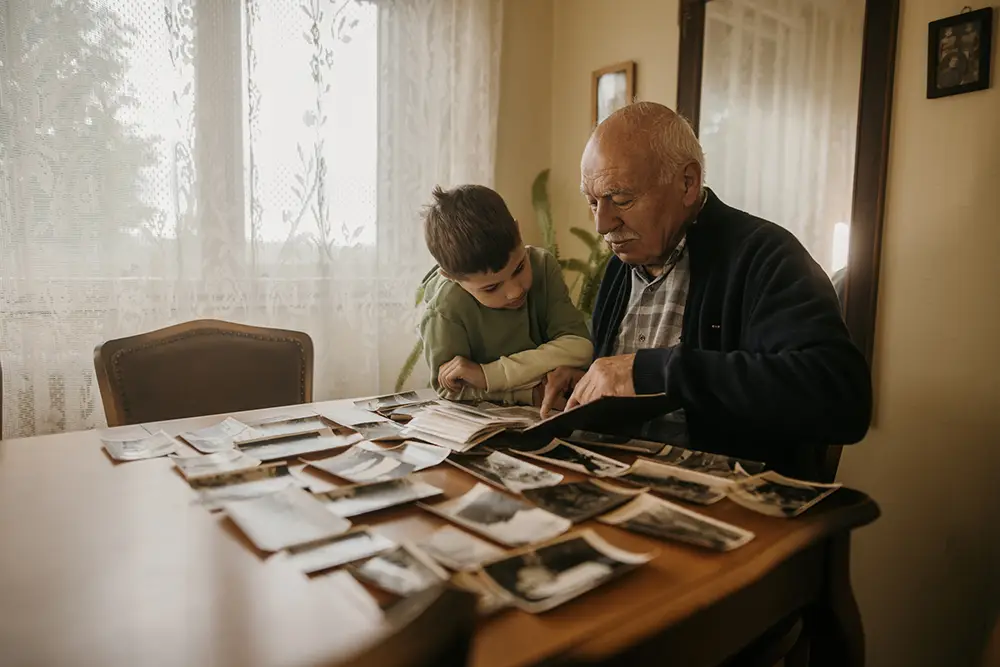How Seniors Can Trace Their Family Tree
Family genealogy is a way to learn about your family’s history and learn about yourself. If you’re spending more time indoors, this can be an engaging pastime to while away the hours.
Once upon a time, you may have needed to travel to significant places in your family history to conduct research, but nowadays the multitude of genealogy websites makes it possible to search for records in the comfort of your home.
If you’re wondering how seniors can trace their family history, these websites are the way to go. They make ancestry research among the indoor activities for seniors highly accessible for all levels of physical ability.
Is Genealogy the Same As Family History?
Genealogy is the tracing of your ancestors, documenting births, deaths and marriages as far back as possible in your family lineage. Family history is more of an in-depth study of the lineage in a family, including life stories, education, medical conditions, military service, and where and how people lived.

Why Research Your Family History?
Researching your family history can be a large undertaking, but is worth it for so many reasons:
- It’s a meaningful way to spend time with younger generations, including your children and grandchildren.
- By piecing together your family’s medical history, you’ll know what kinds of illnesses affected your relatives, and what you and other family members are prone to.
- You may uncover or reconnect with long-lost relatives.
- Through family genealogy, you may discover a connection to an important event or notable person.
- Learning about an ancestor puts a face to the name, deepening your understanding of your own life story.
- Traits such as musical ability or business-mindedness often surface generation after generation, and noting these can add to family pride and legacy.
- Tracing your parents, grandparents, great-grandparents, and great-great-grandparents through their journeys can give you a clear picture of how your family formed.
By creating a picture of your ancestral strengths and weaknesses, abilities and achievements, you’ll help your loved ones understand who they are and where they come from.
5 Steps to Discovery
When exploring your family history, it can feel like you’re diving into a sea of information. Here’s a simple road map to guide you through the process in five easy steps:
-
Begin With What You Know
If you’re wondering how to learn about your family history, start by going through family memorabilia. Gather old photos, letters, family records, postcards and diaries – anything with a date and/or location will provide clues to the past.
Prompt your family members’ memories by showing them what you’ve found while tracing your family tree. You may find that once the conversation starts, different stories will jog their memories of more family information.
-
Choose a Family Tree-Building Website
It’s helpful to centralize the information you find in a generation chart or family group sheet. Using an online genealogical database allows you to organize everything you find and quickly update it. It can also be beneficial in other ways, as a well-subscribed site will host other people’s family trees that may be valuable to your own research. Think of it like detective work about your own history.
Learning how to trace family lineage is easier with the many ancestry websites offering free research tools, downloadable charts, and other resources for beginners. You can find examples of these at American Ancestors.org.
Another popular website is Ancestry.com, home to over 27 billion records, more than 100 million family trees, and millions of DNA profiles. It also offers Ancestry Academy, with quick how-to videos ideal for the beginning researcher. Archives.com has a core collection of U.S. historical records and may be a good option if your family has been in the United States for several generations. FamilySearch.org is an international nonprofit organization boasting the world’s largest shared family tree and a database of over a billion unique profiles.
-
Take a DNA Test
If you haven’t yet taken a DNA test, consider doing it to aid your research. Depending on the service you choose, you’ll be linked to other individuals who match and who may know something about your origins that you don’t. 23andMe® is best known for its health reports and its over 10 million DNA profile pool.
AncestryDNA® provides tools to collect your family artifacts in one place, compare family trees with other users to see how they might be related, and trace ancestral migration patterns. FamilyTreeDNA offers various levels of DNA testing to trace your paternal and maternal lines, as well as community projects where you can join with others of the same cultural or surname origin.

-
Explore Online Resources
Start with the National Archives for links to census, military and immigration records, including ship passenger lists, as well as naturalization and land records. If you’re a member of a public library, check to see if it offers access to free genealogical research options and genealogy websites.
The USGenWeb Project provides free links to state websites and county websites, and guides to listings of local resources for records, county and state histories, maps, and more. You can also look through newspaper pages from 1789 to 1963 on Chronicling America, a website sponsored by the U.S. Library of Congress and National Endowment for the Humanities. There you can search for a family member by name.
And for digitized US military records from the Civil War onward, try Fold3.com. This website helps you with basic finding strategies, add ancestral memorials, and organize a gallery of family content.
-
Share What You Find
Once you’ve made discoveries about your heritage, showcase them in your home or share them at a family reunion. Here are some ideas:
- Designate a special shelf for precious family objects in your home.
- Create a scrapbook with photos of ancestors, adding names, dates and locations.
- Write short stories about your ancestors and publish them in the form of a book.
- Create a family tree to display – this is a project that could involve the grandkids.
- Save photos of ancestors and their stories in a digital format to share.
- Record video/audio interviews with living family members and share via YouTube.
- Create a time capsule containing photos, recipes, newspaper clippings, etc.
These activities not only preserve your family’s history but also provide opportunities for bonding and passing down stories from generation to generation.
Experience the Vibrant Lifestyle at Brandon Wilde
If you’re interested in genealogy discovery, you very likely have that in common with the active, social residents of Brandon Wilde. Our calendar is filled with resident classes, committees and activities for seniors where you can pick up a new hobby and get to know your neighbors.
Contact us today to learn more and schedule a tour.

